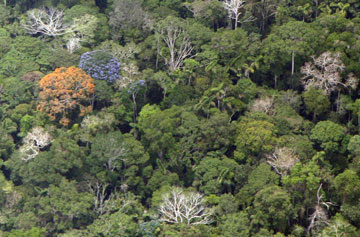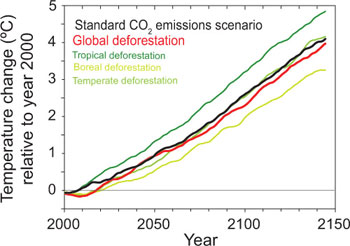Could global deforestation fight climate change?
Could global deforestation fight climate change?
Rhett A. Butler, mongabay.com
April 9, 2007
Forest clearing in temperature regions may cool planet but have other adverse effects
While many climate change mitigation schemes rely on reforestation schemes to sequester carbon dioxide from the atmosphere, those located in temperate regions may actually be warming the planet, worsening global change, reports a new study published in the April 9-13 online edition of the Proceedings of the National Academy of Sciences. Surprisingly, the research suggests that global-scale deforestation would produce a net cooling effect, but that forest preservation efforts and reforestation in the tropics is more effective in cooling the planet.
The researchers, led by Lawrence Livermore National Laboratory atmospheric scientist Govindasamy Bala, used a three-dimensional model representing physical and biogeochemical interactions among land, atmosphere, and ocean to simulate the impact of large-scale deforestation on climate. They found that polar forests warm the Earth “because their dark canopy absorbs sunlight that would otherwise be reflected back to space by a bright white covering of snow.” This absorption of sunlight outweighs the cooling effect of carbon storage. Bala and colleagues say the expected climate-fueled expansion of boreal forests in the future will worsen global warming, making some places up to 10 degrees Fahrenheit warmer by 2100 than they are today.
 
Canopy of the Amazon rainforest in Peru (top – Rhett A. Butler). Global-mean surface temperature change for the period 2000-2150 in the CO2 emissions scenario and the same emissions with global deforestation or deforestation in different latitude bands. The warming effect of forests is most pronounced where there is seasonal snow. The cooling effect of forests is strongest in the tropics, due both to high carbon storage in tropical forests and due to the fact that tropical forests can help cause cooling clouds to develop. (bottom – courtesy of Bala and colleagues). |
In comparison, tropical forests cool the planet by storing large amounts of carbon and producing reflective clouds increasing surface albedo.
The authors say the findings reveal the importance of tropical forest conservation in fighting global warming.
“Our study shows that only tropical rainforests are strongly beneficial in helping slow down global warming,” Bala said. “It is a win-win situation in the tropics because trees in the tropics, in addition to absorbing carbon dioxide, promote convective clouds that help to cool the planet. In other locations, the warming from the albedo effect either cancels or exceeds the net cooling from the other two effects.”
“Tropical forests are like Earth’s air conditioner,” said Ken Caldeira of the Carnegie Institute’s Department of Global Ecology at Stanford University. “When it comes to rehabilitating forests to fight global warming, carbon dioxide might be only half of the story; we also have to account for whether they help to reflect sunlight by producing clouds, or help to absorb it by shading snowy tundra.”
The researchers say that despite finding that total forest clearing would result in a slight net cooling of the planet, there would be other wide-ranging consequences from large-scale deforestation.
“The destruction of ecosystems to prevent global warming would be a counterproductive and perverse strategy,” they wrote.
“The cooling that could potentially arise from deforestation outside the tropics should not necessarily be viewed as a strategy for mitigating climate change because, apart from their potential climatic role, forests are valuable in many aspects. They provide natural habitat to plants and animals, preserve the biodiversity of natural ecosystems, produce economically valuable timber and firewood, protect watersheds through prevention of soil erosion, and indirectly prevent ocean acidification by reducing atmospheric CO2,” they continued. “In planning responses to global challenges, therefore, it is important to pursue broad goals and to avoid narrow criteria that may lead to environmentally harmful consequences.”
“A primary reason we are trying to slow global warming is to protect nature,” he explains. “It just makes no sense to destroy natural ecosystems in the name of saving natural ecosystems.”
Globally, forests are estimated to hold around 600 gigatons of carbon. Deforestation is responsible for about 20 percent of anthropogenic greenhouse gas emissions.
Related articles
Temperate forests may worsen global warming, tropical forests fight higher temperatures. December 5, 2005–At this week’s climate conference in Montreal there have been a number of proposals to plant trees for the purpose of absorbing carbon emissions and helping mitigate climate change. However, a new study from the Carnegie Institution’s Department of Global Ecology and Lawrence Livermore National Laboratory says that careful consideration should be given as to where these forests are planted. Planting trees in temperate regions could actually contribute to global warming.
Temperate forests do not help fight global warming. December 11, 2006–Trees planted in temperate zones could worsen global warming according to research that will be presented on December 15 at the American Geophysical Society annual meeting in San Francisco. The study, which shows that trees planted in tropical regions can help fight climate change, found that global forests actually produce a net warming of the planet. “Forests affect climate in three different ways: they absorb the greenhouse gas carbon dioxide from the atmosphere and help to keep the planet cool; they evaporate water to the atmosphere and increase cloudiness, which also helps keep the planet cool; and they are dark and absorb a lot of sunlight, warming the Earth,” stated a release from the Lawrence Livermore National Laboratory, one of the institutions involved in the research. “Climate change mitigation strategies that promote planting trees have taken only the first effect into account.”
CITATION: G. Bala, K. Caldeira, M. Wickett, T. J. Phillips, D. B. Lobell, C. Delire, and A. Mirin (2007) “Combined climate and carbon-cycle effects of large-scale deforestation” PNAS April 17, 2007 vol. 104 no. 16: 6550-6555 www.pnas.org/cgi/doi/10.1073 pnas.0608998104